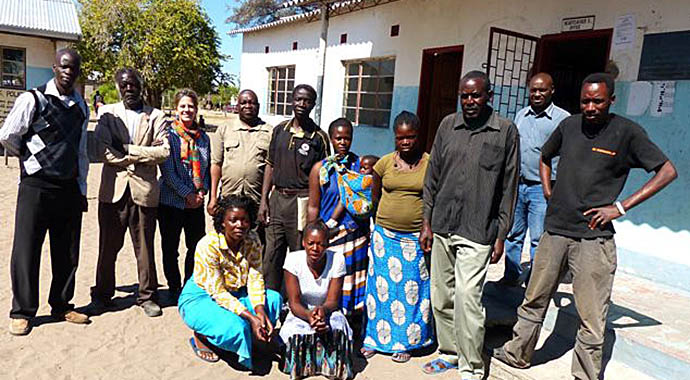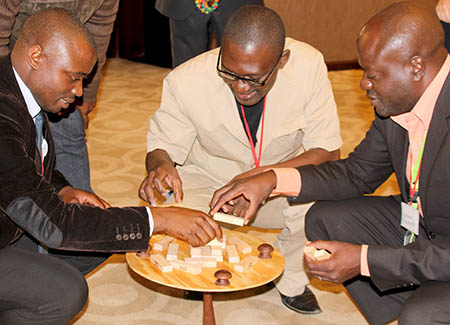Ogmius exchangeThe first article is authored by Leslie Dodson. Leslie recently received a Ph.D. in Technology, Media & Society from the University of Colorado Boulder. Her research involves the design of a communications system for the largest fog water harvesting project in North Africa which will serve hundreds of rural Berber residents in southwest Morocco. Prior to pursuing a Ph.D., Leslie was a senior foreign correspondent for CNBC, MSNBC, NHK-Tokyo and Reuters. Over the course of her 25-year journalism career, she specialized in reporting on climate change, global environmental issues, international development and emerging market economics. Leslie has a Master’s Degree in Journalism from Northwestern University; a Certificate in Conservation Biology from the Center for Environmental Research and Conservation at the Earth Institute, Columbia University; and a Certificate in Permaculture Design. Leslie presented a Ted Talk, “Don’t Misrepresent Africa,” focusing on negative stereotypes and media coverage of the Continent. Promoting Climate Understanding and Adaptation: A Role for Serious Games and Effective Communication Technology by Leslie Dodson
|
I had the opportunity to join the Red Cross/Red Crescent Climate Centre this summer working with the Zambia Red Cross Society and with a partner organization, Indigo, in South Africa studying how ‘serious’ games promote better mid-to-long term decisions regarding climate change adaptation and disaster risk reduction in sub-Saharan Africa. The Climate Centre serves as a research and resource base for the Red Cross/Red Crescent on climate change and disaster risk reduction. Zambia has been a focus area for the Climate Centre because it faces a host of climate change-related challenges that will likely affect the nation’s already vulnerable agriculture, forestry, health, water and energy sectors.
In order to help a range of humanitarian stakeholders – policymakers, aid workers, scientists and community members – better understand and grapple with climate uncertainty and climate-related challenges, the Climate Centre has created more than 40 participatory, group-style games. The games, all of which involve a facilitator, stimulate players to become better informed about adaptation by enabling players to “inhabit” the reality of climate-risk management in a captivating and fun way. Some games focus on building team spirit and developing better communication channels, others challenge players to incorporate or respond to increasingly complex circumstances involving climate change and risk reduction. The games are flexible enough to suit a variety of adaptation and disaster risk reduction scenarios. For example, one game might focus on food security, another might educate players on interpreting and acting on climate information, and another might focus on disaster communication and response. The ultimate goal of the games is to help players make better decisions now in order to prepare for climate-related risks and opportunities in the future.
While in Zambia, I joined in on two Climate Centre and Future Climate for Africa workshops featuring climate games and experiential learning for climate adaptation. (The FCFA initiative is funded by the UK Department for International Development.) The workshops, one in Livingstone and one in Lusaka, sought to elevate forecast-based information into planning and decision-making for Zambia’s future. Red Cross/Red Crescent colleagues from around Zambia, along with regional meteorologists, development practitioners, policymakers and journalists participated in game sessions where they anticipated future development scenarios in Zambia that might be affected by a changing climate. Zambia, for instance, will likely face increased rainfall, changes in flood patterns and longer droughts that will affect infrastructure and public works projects such as roads and dams as well as cause shifts in disease patterns or alterations in dietary habits. The serious games helped players understand these complex climate-related relationships.
Part of my work involved videotaping serious game activities in order to produce a series of instructional videos to train game facilitators. I collected video and interviews from gameplay at the Zambia workshops and from a rural community near Nieuwoudtville, South Africa where I traveled to work with the Indigo development and change NGO. Indigo specializes in participatory climate change adaptation projects with marginalized local communities, many of which involve the use of climate-related games designed by Indigo’s director, Bettina Koelle.
In addition to studying how climate-related games can help stakeholders make better decisions about future climate risks and opportunities, I also spent time investigating communication networks and data collection techniques along the Zambezi River basin. My PhD research in Information and Communication Technology for Development (ICTD) at the ATLAS Institute prepared me to conduct a technology assessment of mobile phone use and network availability that can assist the Zambia Red Cross Society in improving early warning and flood preparedness communication in the area. Specifically, I worked with the Zambia Red Cross project analyst from Kazungula to investigate how mobile phones might be used to get flood-related observations and data transmitted to and from affected stakeholders. I also interviewed members of the Satellite Disaster Management Committee of the Zambia Red Cross in Kasaya, who recounted the myriad communication challenges they face including a lack of data such as intra-day rainfall data or wind maps that would help them prepare for weather events. They are also challenged by a lack of access to existing information, exacerbated by insufficient communication technology. And then there’s the persistent disconnect between climate models provided by scientists and forecasters and the needs of information consumers such as rural farmers who want practical, actionable information.
This Red Cross/Red Crescent research opportunity was an invaluable experience on many levels. I discovered the incredible potential the climate games have to help stakeholders develop skills to make better long-range plans, become informed about humanitarian issues, make wise choices and integrate science into decisions. I also saw firsthand how immersive, purpose-driven and playful activities encourage better decision-making. Furthermore, I came away with a greater understanding of how challenging it is to convey climate information and forecasts.
It may seem that games and technology networks have little in common, but through this Red Cross/Red Crescent internship I saw how low-tech serious games and high-tech communication networks both contribute to better communication and understanding of climate risks and opportunities.
 Leslie Dodson
Leslie Dodson
leslie.dodson@colorado.edu



